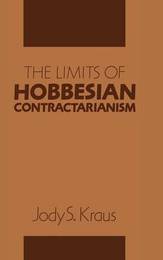
|
The Limits of Hobbesian Contractarianism
Hardback
Main Details
| Title |
The Limits of Hobbesian Contractarianism
|
| Authors and Contributors |
By (author) Jody S. Kraus
|
| Physical Properties |
| Format:Hardback | | Pages:350 | | Dimensions(mm): Height 229,Width 152 |
|
| Category/Genre | Western philosophy - c 1600 to c 1900 |
|---|
| ISBN/Barcode |
9780521420624
|
| Classifications | Dewey:320.01 |
|---|
| Audience | | Professional & Vocational | |
|---|
|
Publishing Details |
| Publisher |
Cambridge University Press
|
| Imprint |
Cambridge University Press
|
| Publication Date |
28 January 1994 |
| Publication Country |
United Kingdom
|
Description
This book is the most comprehensive, rigorous critique of contemporary Hobbesian contractarianism as expounded in the work of Jean Hampton, Gregory Kavka, and David Gauthier. Professor Kraus argues that the attempts by these three philosophers to use Hobbes to answer current political and moral questions fail. The reasons why they fail are related to fundamental problems intrinsic to Hobbesian contractarianism: first, the problem of collective action arising out of the tension in Hobbes' theory between individual and collective rationality; second, the classical problem of explaining the normative force of hypothetical action, a problem that can be traced to the conflicting strategies of hypothetical justification found in Rawls' and Hobbes' theories. Given the deep interest in Hobbesian contractarianism among philosophers, political theorists, game theorists in economics and political science, and legal theorists, this book is likely to attract wide attention and infuse new life into the contractarian debate.
Reviews'Kraus presents the most thorough analysis and critique of contractarian methodology I have seen. His book is likely to become the standard reference on modern contractarian theories in the Hobbesian tradition.' Gregory Kavka, University of California, Irvine 'An extremely careful, well-informed, and philosophically incisive discussion of recent work on social contract theory in the Hobbesian tradition.' Stephen Darwall, University of Michigan
|